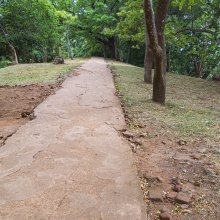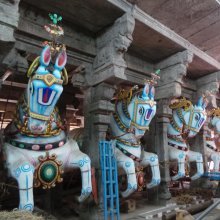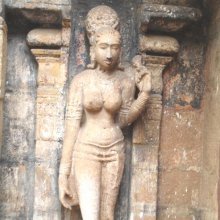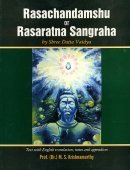Prakara, Prākāra: 30 definitions
Introduction:
Prakara means something in Buddhism, Pali, Hinduism, Sanskrit, Jainism, Prakrit, the history of ancient India, Marathi, Hindi. If you want to know the exact meaning, history, etymology or English translation of this term then check out the descriptions on this page. Add your comment or reference to a book if you want to contribute to this summary article.
Images (photo gallery)
(+45 more images available)
In Hinduism
Vastushastra (architecture)
Source: Shodhganga: Temples of Salem region Up to 1336 ADPrākāra (प्राकार) is an enclosure wall built around the building. It may be a temple, a palace or any other similar important structure, prākāra for a building may be more than one in number. They will be generally concentric in nature. Prākāra, according to Mānasāra, is an enclosure, wall, fence, rampart or a surrounding wall. The uses of prākāra, according to Mānasāra, are many. They are built for strength- (bala), for accommodating deities (parivāra), for beauty (śobha) and for defence (rakṣaṇa). The prākāras up to five are mentioned in Mānasāra and Mayamata.
Source: OpenEdition books: Architectural terms contained in Ajitāgama and RauravāgamaPrākāra (प्राकार) refers to “enclosure, surrounding wall §§ 2.5, 24; 3.6; 4.33, 36; 5.1, 5, 12.”.—(For paragraphs cf. Les enseignements architecturaux de l'Ajitāgama et du Rauravāgama by Bruno Dagens)
Source: Brill: Śaivism and the Tantric Traditions (architecture)1) Prākāra (प्राकार) refers to a “wall”, according to the Mohacūrottara (verse 4.234-243).—Accordingly, [while describing the construction of the maṭha]—“And a maṭha for ascetics to stay in should be in the south. For they, as devotees of Śiva, should reside to the right [of Śiva]. One should build a wall (prākāra) at a distance 1 temple-width beyond the temple base. At a distance from there is the housing for ascetics. [...]”.
2) Prākāra (प्राकार) refers to the “(outer) walls” (of the temple), according to the Devyāmata (chapter 105).—Accordingly, [while describing the construction of the maṭha]—“A residence is recommended to the south of the temple. The residence should be built beyond the outer wall (prākāra—prākārasya bahiḥ) of the temple. It is to be dwelt in by initiates, their senses well-subordinated, who have come to the image. Or, in its absence, [they should dwell in] another pleasant place. [...]”.

Vastushastra (वास्तुशास्त्र, vāstuśāstra) refers to the ancient Indian science (shastra) of architecture (vastu), dealing with topics such architecture, sculpture, town-building, fort building and various other constructions. Vastu also deals with the philosophy of the architectural relation with the cosmic universe.
Vyakarana (Sanskrit grammar)
Source: Wikisource: A dictionary of Sanskrit grammarPrakāra (प्रकार).—(l) attribute, attribute which differentiates, manner, difference; differentiating description: cf. कंचि-त्प्रकारं प्राप्तः इत्थंभूतः (kaṃci-tprakāraṃ prāptaḥ itthaṃbhūtaḥ) Kas. on P.II.3.21: (2) resemblance, similarity of one thing with another with slight deficiency: cf. प्रकारे गुणवचनस्य । प्रक्रारो भेदः सादृश्यं च। तदिह सादृश्यं प्रकारो गृह्यते । प्रकारे वर्तमानस्य गुणवचनशब्दस्य द्वे भवतः । पटुपटुः मृदुमृदुः । अपरिपूर्णगुण इत्यर्थः । परि-पूर्णगुणेन न्यूनगुणस्य उपमाने सत्येवं प्रयुज्यते (prakāre guṇavacanasya | prakrāro bhedaḥ sādṛśyaṃ ca| tadiha sādṛśyaṃ prakāro gṛhyate | prakāre vartamānasya guṇavacanaśabdasya dve bhavataḥ | paṭupaṭuḥ mṛdumṛduḥ | aparipūrṇaguṇa ityarthaḥ | pari-pūrṇaguṇena nyūnaguṇasya upamāne satyevaṃ prayujyate) Kas. on P. VIII.1.12; (3) differentiating attribute; cf. प्रकारवचने थाल् (prakāravacane thāl) V. 3.23, प्रकारवचने जातीयर् (prakāravacane jātīyar) V. 3.69, स्यूलादिभ्यः प्रकारवचने कन् (syūlādibhyaḥ prakāravacane kan) V. 4.3 where Kasika defines the word प्रकार (prakāra) as सामान्यस्य भेदको विशेषः प्रकारः (sāmānyasya bhedako viśeṣaḥ prakāraḥ) Ka, on V. 3.23 and 69; (4) type, cf. इतिशब्दः प्रकारार्थः (itiśabdaḥ prakārārthaḥ) Kas. on V. 2.93: cf. also अदिशब्दः प्रकारे (adiśabdaḥ prakāre) Kas. on देवपथादिभ्यश्च (devapathādibhyaśca) P.V.3.100; cf also आदिइाब्दः प्रकारे वर्तते । देवदत्तादय आढ्याः । देवदत्तप्रकारा इत्यर्थः (ādiiाbdaḥ prakāre vartate | devadattādaya āḍhyāḥ | devadattaprakārā ityarthaḥ) M.Bh. on I.3.1 Vart. 11.

Vyakarana (व्याकरण, vyākaraṇa) refers to Sanskrit grammar and represents one of the six additional sciences (vedanga) to be studied along with the Vedas. Vyakarana concerns itself with the rules of Sanskrit grammar and linguistic analysis in order to establish the correct context of words and sentences.
Natyashastra (theatrics and dramaturgy)
Source: Wisdom Library: Nāṭya-śāstra1) Prakāra (प्रकार, “variety”) refers to one of the five cause of songs (dhrūva) according to the Nāṭyaśāstra chapter 32:—“the number of syllables in the metre of a dhruvā constitute its class (jāti). Such numbers being odd or even, will give rise to its variety (prakāra)”.
2) Prakāra (जाति) refers to a set of twenty rules used in the playing of drums (puṣkara) [with reference to Mṛdaṅga, Paṇava and Dardura] according to the Nāṭyaśāstra chapter 33.
The following are the eighteen prakāras connected with the eighteen jātis:
- Citra,
- Sama,
- Vibhakta,
- Chinna,
- Chinnaviddha,
- Viddha,
- Anuviddha,
- Svarūpānugata,
- Anusṛta,
- Vicyuta,
- Durga,
- Avakīrṇa,
- Ardhāvakīrnā,
- Ekarūpa,
- Parikṣipta,
- Sācīkṛta,
- Samalekha,
- Citralekha,
- Sarvasamavāya,
- Dṛḍha
These different prakāras of the playing of drums, should be taken up to follow movements and songs, after considering the Sentiments and the States involved. Prakāras and jātis apply to all mārgas. But in movements they are to be in their pure forms.

Natyashastra (नाट्यशास्त्र, nāṭyaśāstra) refers to both the ancient Indian tradition (shastra) of performing arts, (natya—theatrics, drama, dance, music), as well as the name of a Sanskrit work dealing with these subjects. It also teaches the rules for composing Dramatic plays (nataka), construction and performance of Theater, and Poetic works (kavya).
Shaktism (Shakta philosophy)
Source: Google Books: Manthanabhairavatantram1) Prākāra (प्राकार) refers to the “(golden) walls” (adorning the sacred seat of Oḍḍiyāna), according to the Ṣaṭsāhasrasaṃhitā, an expansion of the Kubjikāmatatantra: the earliest popular and most authoritative Tantra of the Kubjikā cult.—Accordingly, “The venerable great lord of Oḍra resides in the cavity in the Middle Land. It is (Oḍḍiyāna) the first (sacred seat) and, yellow in colour, it has mountains, forests, and groves, large and small, and is adorned with golden walls [i.e., hema-prākāra-maṇḍita]. It has rivers and rivulets and many (other) things. It is full of all the seeds and is square all around. It has thunderbolts as door chains and Mālinī (who resides there) holds a thunderbolt (vajra) in her hand. Endowed with the sovereignty of the Wheels, it is the sacred seat (Udyāna) attended by the mistress of the sacred seat”.
2) Prakāra (प्रकार) or Ṣaṭprakāra refers to the “six modalities” of Kula, according to the Kularatnoddyota verse 1.30-35ab.—These six ‘modalities’ (ṣaṣ-prakāra) or ‘authorities’ are the lineages established by Matsyendranātha. The ‘prior’ Kula tradition is the one in which this six-fold division prevailed originally. The subsequent—paścima-kula tradition of the Kubjikā Tantras took it over. Also incorporated into the other two major independent Kaula traditions, the Kālīkrama and Trikakula, their names are well known.
Kula has the following six modalities (ṣaṣ-prakāra):—
- Ānanda,
- Āvali,
- Prabhu,
- Yogin,
- Atīta,
- Pāda.

Shakta (शाक्त, śākta) or Shaktism (śāktism) represents a tradition of Hinduism where the Goddess (Devi) is revered and worshipped. Shakta literature includes a range of scriptures, including various Agamas and Tantras, although its roots may be traced back to the Vedas.
Shaivism (Shaiva philosophy)
Source: SOAS University of London: Protective Rites in the Netra TantraPrakāra (प्रकार) refers to the “nature” (of a deity), according to the Netratantra of Kṣemarāja: a Śaiva text from the 9th century in which Śiva (Bhairava) teaches Pārvatī topics such as metaphysics, cosmology, and soteriology.—Accordingly, [verse 13.1-9, while describing the appearance and worship of Viṣṇu]—“Or, [the Mantrin] worships a very handsome, eight-armed, yellow Deva. [...] With whatever his nature (prakāra—yena yena prakāreṇa), one should recall him with any state of being. It is said Bhairava is made up of him. Pārameśvarī is called order. [This then is the abode of Mṛtyujit]. [...]”.

Shaiva (शैव, śaiva) or Shaivism (śaivism) represents a tradition of Hinduism worshiping Shiva as the supreme being. Closely related to Shaktism, Shaiva literature includes a range of scriptures, including Tantras, while the root of this tradition may be traced back to the ancient Vedas.
Purana and Itihasa (epic history)
Source: archive.org: Shiva Purana - English Translation1) Prakāra (प्रकार) refers to “different kinds (of gems and jewels)” (suitable for a marriage ceremony)”, according to the Śivapurāṇa 2.3.37 (“The letter of betrothal is dispatched”).—Accordingly, as Himavat prepared the wedding of Menā and Śiva: “[...] Then he began collecting foodstuffs and other requisite articles intended for the performance of the marriage. [...] Tanks were built for butter, spirituous beverages, sweet juices of various kinds and rice preparations of various sorts. Different kinds of pickles and side dishes were prepared that might appeal to Śiva’s Gaṇas and the gods. Different kinds of valuable garments purified in fire were kept ready. Gems and jewels of different kinds (prakāra), gold, silver and other articles were gathered duly. [...]”.
2) Prakāra (प्रकार) refers to the “paraphernalia characteristic” (of lordship), according to the Śivapurāṇa 2.5.6 (“Prayer to Śiva”).—Accordingly, as Śiva said to Brahmā: “O Brahmā, if I am to be proclaimed the emperor of the gods, I do not have the paraphernalia characteristic (tat-prakāra) of my lordship. I do not have a divine chariot and a divine charioteer. I do not possess bows and arrows which accord victory in a battle. If there had been a chariot I could have sat in it and with bow and arrows I could have killed even powerful Asuras, with a resolute determination”.

The Purana (पुराण, purāṇas) refers to Sanskrit literature preserving ancient India’s vast cultural history, including historical legends, religious ceremonies, various arts and sciences. The eighteen mahapuranas total over 400,000 shlokas (metrical couplets) and date to at least several centuries BCE.
Yoga (school of philosophy)
Source: ORA: Amanaska (king of all yogas): A Critical Edition and Annotated Translation by Jason BirchPrākāra (प्राकार) refers to a “wall”, according to the Sarvajñānottara.—The Amanaska’s description of the ideal place in which to practise Yoga is based on four standard characteristics; it should be isolated, solitary, clean and beautiful. Similar descriptions are found in Tantric traditions which predate the Amanaska’s second chapter as well as in the yoga traditions which followed it. For example, in the Sarvajñānottara (25.2-3), the Mantrin collects the cow dung for his bath of ashes and leaves it to dry on a wall (prākāra) [prākāropari śoṣayet] in an isolated, solitary and beautiful place, which is free of strife, trees and ant-hills.

Yoga is originally considered a branch of Hindu philosophy (astika), but both ancient and modern Yoga combine the physical, mental and spiritual. Yoga teaches various physical techniques also known as āsanas (postures), used for various purposes (eg., meditation, contemplation, relaxation).
Ayurveda (science of life)
Toxicology (Study and Treatment of poison)
Source: Shodhganga: Kasyapa Samhita—Text on Visha ChikitsaPrākāra (प्राकार) refers to “buildings”, as taught in the Kāśyapa Saṃhitā: an ancient Sanskrit text from the Pāñcarātra tradition dealing with both Tantra and Viṣacikitsā—an important topic from Āyurveda which deals with the study of Toxicology (Agadatantra or Sarpavidyā).—The Kāśyapasaṃhitā mentions that snake-bites that happen in certain places [like dilapidated buildings (jīrṇa-prākāra)] are highly inimical to the victim.

Āyurveda (आयुर्वेद, ayurveda) is a branch of Indian science dealing with medicine, herbalism, taxology, anatomy, surgery, alchemy and related topics. Traditional practice of Āyurveda in ancient India dates back to at least the first millenium BC. Literature is commonly written in Sanskrit using various poetic metres.
General definition (in Hinduism)
Source: Wisdom Library: HinduismPrakara (प्रकर) is a Sanskrit word referring to the high walls surrounding the temple grounds.
In Buddhism
Tibetan Buddhism (Vajrayana or tantric Buddhism)
Source: OSU Press: Cakrasamvara SamadhiPrākāra (प्राकार) refers to a “(vajra) wall” [i.e., oṃ vajraprākāra hūṃ vaṃ hūṃ], according to the Cakrasaṃvara Samādhi [i.e., Cakrasamvara Meditation] ritual often performed in combination with the Cakrasaṃvara Samādhi, which refers to the primary pūjā and sādhanā practice of Newah Mahāyāna-Vajrayāna Buddhists in Nepal.
Source: MDPI Books: The Ocean of HeroesPrākāra (प्राकार) refers to an “(adamantine) fence”, according to the 10th-century Ḍākārṇava-tantra: one of the last Tibetan Tantric scriptures belonging to the Buddhist Saṃvara tradition consisting of 51 chapters.—Accordingly: [while explaining the body circle (kāyacakra)]: “[...] He should push [the obstacle demons by means of the stakes] into the directions starting with the east inside the adamantine cage. The adamantine ground should be underneath. A net of arrows is [placed] above. Moreover, there are an adamantine fence (vajra-prākāra), [an adamantine] canopy, and the dharmodayā (“origin of phenomenal existences”) inside. It is triangle, [the second one is] square, and [the third one is] pentagonal [in shape]. He should also visualize a hexagonal one, [the fourth one]. He should arrange them all in sequence corresponding to the order of the four layers. [...]”.

Tibetan Buddhism includes schools such as Nyingma, Kadampa, Kagyu and Gelug. Their primary canon of literature is divided in two broad categories: The Kangyur, which consists of Buddha’s words, and the Tengyur, which includes commentaries from various sources. Esotericism and tantra techniques (vajrayāna) are collected indepently.
In Jainism
General definition (in Jainism)
Source: archive.org: TrisastisalakapurusacaritraPrākāra (प्राकार) might be taken as a derivate of prakāra, “sort”, to mean ādi, based on Prakrit pagāra (PH s.v.). This would be quite intelligible, but assumes that Hem. departed from his sources. This, of course, he may have done, but generally in such descriptions he follows the āgamas very closely. There is also the possibility (which also assumes that Hemacandra departed from his sources) that prākāra should be taken just as it is, with the idea of a fluted ball, or perhaps raised patterns could conceivably be called “prākāra”, which would fit, to some extent, the vicchitti of Hāribhadrīyāvaśyakavṛttiṭippaṇaka Muni Jayantavijayaji favors this idea.—(Cf. JAOS 52, p. 88)
Source: The University of Sydney: A study of the Twelve ReflectionsPrakāra (प्रकार) refers to a “nature (of five modes)”, according to the 11th century Jñānārṇava, a treatise on Jain Yoga in roughly 2200 Sanskrit verses composed by Śubhacandra.—Accordingly, “Sentient beings, inflamed by very intense pleasure [and] unsteady from affliction by wrong faith, wander about in a five-fold [com.—with a nature of five modes (pañcaprakāratvena)] life that is difficult to be traversed. It has been stated at length that the cycle of rebirth which is full of suffering is five-fold on account of combining substance, place, right time, life and intention”.
Synonyms: Lakṣma.

Jainism is an Indian religion of Dharma whose doctrine revolves around harmlessness (ahimsa) towards every living being. The two major branches (Digambara and Svetambara) of Jainism stimulate self-control (or, shramana, ‘self-reliance’) and spiritual development through a path of peace for the soul to progess to the ultimate goal.
India history and geography
Source: Yale Journal of Music & Religion: Ritual Music in Contemporary Brahmanical Tantric Temples of KeralaPrākāra (प्राकार) refers to Pañcaprākāra or the “five successive enclosures” surrounding the shrine (=śrīkōvil) of certain temples from Kerala—The earliest Brahmanical temples date from the 9th century, but the architectural design evolved over several centuries and culminated in the systematization of a typical style sanctioned by the Tantrasamuccaya. Such temples, alternatively called kṣetras or ambalams, consist of six parts: (1) the shrine, or śrīkōvil, and (2) the pañcaprākāras, the five successive enclosures surrounding it.

The history of India traces the identification of countries, villages, towns and other regions of India, as well as mythology, zoology, royal dynasties, rulers, tribes, local festivities and traditions and regional languages. Ancient India enjoyed religious freedom and encourages the path of Dharma, a concept common to Buddhism, Hinduism, and Jainism.
Languages of India and abroad
Marathi-English dictionary
Source: DDSA: The Molesworth Marathi and English Dictionaryprakāra (प्रकार).—m (S) Sort, kind, species. 2 Manner, mode, way. Pr. ēka gahūṃ pra0 bahu. 3 In arithmetic &c. A case. pra0 karaṇēṃ g. of o. & pl To tease or distress in various ways.
--- OR ---
prākāra (प्राकार).—m S An enclosure, a fence, a surrounding wall.
Source: DDSA: The Aryabhusan school dictionary, Marathi-Englishprakāra (प्रकार).—m Sort, kind. Manoer, made. prakāra karaṇēṃ To tease in various ways.
--- OR ---
prākāra (प्राकार).—m An enclosure, a surrounding wall.
Marathi is an Indo-European language having over 70 million native speakers people in (predominantly) Maharashtra India. Marathi, like many other Indo-Aryan languages, evolved from early forms of Prakrit, which itself is a subset of Sanskrit, one of the most ancient languages of the world.
Sanskrit dictionary
Source: DDSA: The practical Sanskrit-English dictionaryPrakara (प्रकर).—
1) A heap, multitude, quantity, collection; मुक्ताफलप्रकरभाञ्जि गुहागृहाणि (muktāphalaprakarabhāñji guhāgṛhāṇi) Śiśupālavadha 5.12; बाष्पप्रकरकलुषां दृष्टिम् (bāṣpaprakarakaluṣāṃ dṛṣṭim) Ś.6.9; R.9.56; Kumārasambhava 5.68.
2) A nosegay, bunch of flowers.
3) Aid, assistance, friendship.
4) Usage, practice.
5) Respect.
6) Seduction, abduction.
7) Washing, cleansing (saṃkṣālana); अत्रामत्रप्रकरकरणे वर्ततेऽसौ नियुक्तः (atrāmatraprakarakaraṇe vartate'sau niyuktaḥ) Viś. Guṇa.154.
-ram Aloe-wood.
Derivable forms: prakaraḥ (प्रकरः).
--- OR ---
Prakāra (प्रकार).—
1) Manner, mode, way, fashion; कः प्रकारः किमेतत् (kaḥ prakāraḥ kimetat) Mālatīmādhava (Bombay) 5.2.
2) Sort, kind, variety, species; oft. in comp.; बहुप्रकार (bahuprakāra) manifold; त्रिप्रकार, नाना° (triprakāra, nānā°) &c.
3) Similitude.
4) Speciality, special property or quality; तद्वतितत्प्रकारकोऽनुभवः प्रमा (tadvatitatprakārako'nubhavaḥ pramā) T. S.
5) Difference.
Derivable forms: prakāraḥ (प्रकारः).
--- OR ---
Prākāra (प्राकार).—
1) A fence, a wall, an enclosure.
2) An encircling or surrounding wall, rampart; द्वितीयं हेमप्राकारं कुर्वद्भिरिव वानरैः (dvitīyaṃ hemaprākāraṃ kurvadbhiriva vānaraiḥ) R.12.71; Pañcatantra (Bombay) 1.229.
Derivable forms: prākāraḥ (प्राकारः).
Source: Cologne Digital Sanskrit Dictionaries: Edgerton Buddhist Hybrid Sanskrit DictionaryPrakāra (प्रकार).—(?) in Saddharmapuṇḍarīka 146.5 (verse) puṣpaiḥ (so all mss., KN em. puṣpa-, kept by WT without note) prakāraiḥ sama- laṃkṛtaṃ ca; according to Tibetan adorned with many flowers (me tog maṅ pos). On the face of the reading of the mss. and the Tibetan rendering, prakāra should be an adj., many; it is otherwise known only as a noun, kind, sort. KN's em. hardly helps; with kinds of flowers could not, so far as I know, serve as a substitute for with many kinds…; for this we should expect bahu-, nānā-, or the like, modifying prakāra. I have thought of reading pravāraiḥ, taking it as = pravaraiḥ, excellent, with ā for a m.c.; but Tibetan does not support this.
Source: Cologne Digital Sanskrit Dictionaries: Shabda-Sagara Sanskrit-English DictionaryPrakara (प्रकर).—mfn.
(-raḥ-rī-raṃ) Who or what does much or well. m.
(-raḥ) 1. A heap a, quantity. 2. A bundle of flowers, a nosegay. 3. Aid, assistance, friendship. 4. Usage, custom, continuance of a similar practice. 5. Respect. 6. Seduction, abduction. n.
(-raṃ) Aloe wood, (Agallochum.) f. (-rī) 1. Theatrical dress or disguise, as wearing a woman’s garb, &c. 2. An episodical incident in a drama. 3. An open piece of ground, the meeting of four roads, or the proper scite of any magical operations. E. pra before kṛ to make, aff. ap .
--- OR ---
Prakāra (प्रकार).—m.
(-raḥ) 1. Difference. 2. Similitude. n.
(-raṃ) 1. Sort, kind, species. 2. Way, mode, manner. 3. Property, quality, speciality, E. pra before, kṛ to do, aff. ghañ .
--- OR ---
Prākāra (प्राकार).—m.
(-raḥ) An inclosure, a fence, a rampart, particularly a surrounding wall, &c. elevated on a mound of earth. E. pra and āṅ implying initial, first, kṛ to make, aff. ghañ; otherwise the prefix is considered as pra only, the vowel being made long by the affix being ghañ .
Source: Cologne Digital Sanskrit Dictionaries: Benfey Sanskrit-English DictionaryPrakara (प्रकर).—i. e. pra-kṛ̆ + a, I. m. 1. A heap, a quantity, plenty, [Śākuntala, (ed. Böhtlingk.)] [distich] 136. 2. Aid. 3. Custom, use. Ii. n. Aloe-wood. Iii. f. rī. 1. A kind of song, [Yājñavalkya, (ed. Stenzler.)] 3, 113. 2. A short interlude in a drama.
--- OR ---
Prakāra (प्रकार).—i. e. pra-kṛ + a, m. 1. Kind, Mahābhārata 1, 7412; species, [Ṛtusaṃhāra] 1, 2. 2. Speciality, Bhāṣāp. 134. 3. Way, manner, [Pañcatantra] 199, 20.
--- OR ---
Prākāra (प्राकार).—i. e. pra-kṛ + a + a, m. An inclosure, a surrounding wall, [Pañcatantra] iii. [distich] 48; [Daśakumāracarita] in
Prakara (प्रकर).—[masculine] heap, multitude.
--- OR ---
Prakāra (प्रकार).—[masculine] manner, way, sort, kind; °— adj. like, -fold, [abstract] tva [neuter]
--- OR ---
Prākāra (प्राकार).—[masculine] encircling wall, rampart.
Source: Cologne Digital Sanskrit Dictionaries: Monier-Williams Sanskrit-English Dictionary1) Prakara (प्रकर):—[=pra-kara] 1a etc. See pra-√kṛ.
2) [v.s. ...] 2a See pra-√kṝ, p.654.
3) Prakāra (प्रकार):—[=pra-kāra] a etc. See pra-√kṛ.
4) Prakara (प्रकर):—[=pra-kara] [from pra-kṛ] 1b mf(ī)n. (for 2. See pra-kṝ) doing much or well, [Horace H. Wilson]
5) [v.s. ...] m. aid, friendship, [ib.]
6) [v.s. ...] usage, custom, [ib.]
7) [v.s. ...] respect, [ib.]
8) [v.s. ...] seduction, [ib.]
9) Prakāra (प्रकार):—[=pra-kāra] [from pra-kṛ] b m. sort, kind, nature, class, species, way, mode, manner, [Atharvaveda-prātiśākhya; Kauśika-sūtra; Manu-smṛti; Mahābhārata] etc.
10) [v.s. ...] kena prakāreṇa, in what way? how? [Pañcatantra]
11) [v.s. ...] raiḥ, in one way or another, [Rāmāyaṇa]
12) [v.s. ...] rāmāyaṇasya bhāratasya vā prakāraḥ, a kind of [Rāmāyaṇa] or, [Mahābhārata; Rājataraṅgiṇī] (mostly ifc. mfn.; cf. tri- ‘of three kinds’, nānā-, bahu-)
13) [v.s. ...] similitude or difference, [cf. Lexicographers, esp. such as amarasiṃha, halāyudha, hemacandra, etc.]
14) Prakara (प्रकर):—[from pra-kṝ] 2b m. (for 1. See pra-kṛ) a scattered heap, heap, multitude, quantity, plenty, [Mahābhārata; Kāvya literature] etc.
15) [v.s. ...] a nosegay, [Horace H. Wilson]
16) [from pra-kṝ] n. aloe wood, Agallochum, [cf. Lexicographers, esp. such as amarasiṃha, halāyudha, hemacandra, etc.]
17) Prākāra (प्राकार):—[=prā-kāra] [from prā] a See sub voce
18) Prākara (प्राकर):—m. Name of a son of Dyutimat, [Mārkaṇḍeya-purāṇa]
19) n. Name of a Varṣa called after Prākara, [ib.] ([varia lectio] pīvara, [Viṣṇu-purāṇa])
20) Prākāra (प्राकार):—[=prā-kāra] b m. ([from] prā for pra and √1. kṝ; cf. [Pāṇini 6-3, 122], [vArttika] 1, [Patañjali]) a wall, enclosure, fence, rampart ([especially] a surrounding wall elevated on a mound of earth; ifc. f(ā). ), [???; Manu-smṛti; Mahābhārata etc.]
Source: Cologne Digital Sanskrit Dictionaries: Yates Sanskrit-English Dictionary1) Prakara (प्रकर):—[pra-kara] (raḥ) 1. m. A heap; a nosegay; aid; usage; respect; seduction. f. Theatrical dress; open piece of ground; meeting of four roads; minor plot. n. Aloe wood a. Doing much or well.
2) Prakāra (प्रकार):—[pra-kāra] (raḥ) 1. m. Difference; similitude. n. Sort, kind; way, mode.
3) Prākāra (प्राकार):—[prā+kāra] (raḥ) 1. m. An inclosure, a fence.
Source: DDSA: Paia-sadda-mahannavo; a comprehensive Prakrit Hindi dictionary (S)Prakara (प्रकर) in the Sanskrit language is related to the Prakrit words: Pagara, Pagāra, Payara, Payāra, Pākāra, Pāgāra, Pāyāra.
[Sanskrit to German]
Sanskrit, also spelled संस्कृतम् (saṃskṛtam), is an ancient language of India commonly seen as the grandmother of the Indo-European language family (even English!). Closely allied with Prakrit and Pali, Sanskrit is more exhaustive in both grammar and terms and has the most extensive collection of literature in the world, greatly surpassing its sister-languages Greek and Latin.
Hindi dictionary
Source: DDSA: A practical Hindi-English dictionary1) Prakara (प्रकर) [Also spelled prakar]:—(nm) a circle (as of friends, associates, etc.); assembly.
2) Prakāra (प्रकार) [Also spelled prakar]:—(nm) kind; quality; mode, manner; way, method; type; pattern; -[bheda] difference in kind/quality/type; -[vidyā] typology.
3) Prākāra (प्राकार) [Also spelled prakar]:—(nm) a parapet; rampart.
...
Kannada-English dictionary
Source: Alar: Kannada-English corpusPrakara (ಪ್ರಕರ):—
1) [noun] a large number of people, animals or things collected at a place; a group; a multitude.
2) [noun] a bunch of flowers.
3) [noun] a myrrhlike gum resin of certain trees used as incense or in making incenses; bdellium.
4) [noun] the act of helping; an aid; an assistance; a help.
5) [noun] the act of using or the state of being used.
6) [noun] respect; regard.
--- OR ---
Prakāra (ಪ್ರಕಾರ):—
1) [noun] a way, mode or manner.
2) [noun] state or instance of being equal; equality.
3) [noun] a special quality, feature, point, characteristic, etc.; speciality.
4) [noun] condition, quality, fact or instance of being different; difference.
5) [noun] (phil.) a distinct or outstanding part, quality or characteristic of something.
--- OR ---
Prākāra (ಪ್ರಾಕಾರ):—
1) [noun] a barrier, as of wooden or thorny plants, metal posts, rails, wire mesh, etc., used as a boundary or means of protection or confinement; a fence.
2) [noun] a wall surrounding a building.
Kannada is a Dravidian language (as opposed to the Indo-European language family) mainly spoken in the southwestern region of India.
See also (Relevant definitions)
Starts with (+16): Prakarabhanjana, Prakaradharani, Prakaragra, Prakaraka, Prakarakarna, Prakarakhanda, Prakaralakshana, Prakaramardi, Prakaramardin, Prakaramtara, Prakaran, Prakarana, Prakaranagrantha, Prakaranapada, Prakaranapancika, Prakaranasama, Prakaranashas, Prakaranata, Prakaranatas, Prakaranatva.
Ends with (+91): Aghoramantrasadhanaprakara, Agnisamaropanaprakara, Ahananaprakara, Ajataprakara, Akaraprakara, Anasravaprakara, Anikaprakara, Aprakara, Aradhanaprakara, Aranyaprakara, Ashvatthasevanaprakara, Atmavidyaprakara, Aurvaprakara, Aushadhaprakara, Bahiprakara, Bahitprakara, Bahuprakara, Bashpaprakara, Bhedaprakara, Bhinnaprakara.
Full-text (+271): Payara, Pagara, Prakarata, Kimprakaram, Prakariya, Idamprakaram, Prakarika, Aprakara, Bahuprakaram, Sarvaprakaram, Pramshuprakara, Prakarabhanjana, Prakaramardi, Varmavant, Prakaramardin, Prakaradharani, Prakarakhanda, Prakarashesha, Prakarakarna, Prakarastha.
Relevant text
Search found 69 books and stories containing Prakara, Pra-kara, Pra-kāra, Prā-kāra, Prākāra, Prakāra, Prākara; (plurals include: Prakaras, karas, kāras, Prākāras, Prakāras, Prākaras). You can also click to the full overview containing English textual excerpts. Below are direct links for the most relevant articles:
Kashyapa Shilpa-shastra (study) (by K. Vidyuta)
3. Pañcaprākāra (Five types of Prākāras) < [Chapter 3 - Prākāra Lakṣaṇa]
1-2. Etymology and Definition of Prākāra < [Chapter 3 - Prākāra Lakṣaṇa]
1. Conclusion (Prākāras) < [Chapter 6 - Conclusion]
Garga Samhita (English) (by Danavir Goswami)
Verse 2.8.19 < [Chapter 8 - Description of Seeing Lord Kṛṣṇa]
Verse 1.2.37 < [Chapter 2 - Description of the Abode of Śrī Goloka]
Verse 1.2.13 < [Chapter 2 - Description of the Abode of Śrī Goloka]
Vakyapadiya of Bhartrihari (by K. A. Subramania Iyer)
Verse 3.14.618 < [Book 3 - Pada-kāṇḍa (14): Vṛtti-samuddeśa (On Ccomplex Formation)]
Verse 3.14.619 < [Book 3 - Pada-kāṇḍa (14): Vṛtti-samuddeśa (On Ccomplex Formation)]
Verse 3.14.623 < [Book 3 - Pada-kāṇḍa (14): Vṛtti-samuddeśa (On Ccomplex Formation)]
Early Chola Temples (by S. R. Balasubrahmanyam)
The Manasara < [Chapter XIII - Prasada: Component Parts]
Temples in Tiruvarur < [Chapter VIII - Temples of Uttama Chola’s Time]
Temples in Vriddhachalam < [Chapter VIII - Temples of Uttama Chola’s Time]
Middle Chola Temples (by S. R. Balasubrahmanyam)
Temples in Tiruvarur < [Chapter IV - Temples of Rajendra I’s Time]
Temples in Tiruppainjili < [Aditya I]
Temples in Tiruvanaikkaval (Jambukesvaram) < [Aditya I]
Vastu-shastra (5): Temple Architecture (by D. N. Shukla)
Temples of Madura, the final phase (from 1600 A.D.) < [Chapter 12 - History of Hindu Temples (Prāsādas and Vimānas)]
Pāṇḍya Prākāras and Gopuras < [Chapter 12 - History of Hindu Temples (Prāsādas and Vimānas)]
Related products







